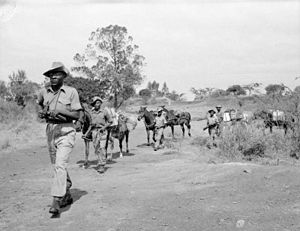
Back Mau Mau Afrikaans انتفاضة ماو ماو Arabic Mau Mau AST مائو مائو عوصیانی AZB Въстание Мау Мау Bulgarian Rebel·lió del Mau-Mau Catalan Povstání Mau Mau Czech Mau Mau-oprøret Danish Mau-Mau-Krieg German Maŭ Maŭ Esperanto
| Mau Mau rebellion | |||||||
|---|---|---|---|---|---|---|---|
| Part of the decolonisation of Africa | |||||||
 Troops of the King's African Rifles on watch for Mau Mau rebels | |||||||
| |||||||
| Belligerents | |||||||
|
Mau Mau rebels[a] | |||||||
| Commanders and leaders | |||||||
|
(1951–1955) (1955–1957) (1957–1960) |
Dedan Kimathi Musa Mwariama Waruhiu Itote Stanley Mathenge (MIA) Kubu Kubu | ||||||
| Strength | |||||||
|
10,000 regular troops 21,000 police 25,000 Kikuyu Home Guard[2][3] | 35,000+ Members[4] | ||||||
| Casualties and losses | |||||||
| 3,000 native Kenyan police and soldiers killed[5] |
12,000–20,000+ killed (including 1,090 executed)[6] 2,633 captured 2,714 surrendered | ||||||
| History of Kenya |
|---|
 |
|
|
The Mau Mau rebellion (1952–1960), also known as the Mau Mau uprising, Mau Mau revolt, or Kenya Emergency, was a war in the British Kenya Colony (1920–1963) between the Kenya Land and Freedom Army (KLFA), also known as the Mau Mau, and the British authorities.[7] Dominated by Kikuyu, Meru and Embu fighters, the KLFA also comprised units of Kamba[8] and Maasai who fought against the European colonists in Kenya, the British Army, and the local Kenya Regiment (British colonists, local auxiliary militia, and pro-British Kikuyu).[9][b]
The capture of rebel leader Field Marshal Dedan Kimathi on 21 October 1956 signalled the defeat of the Mau Mau, and essentially ended the British military campaign.[10] However, the rebellion survived until after Kenya's independence from Britain, driven mainly by the Meru units led by Field Marshal Musa Mwariama. General Baimungi, one of the last Mau Mau leaders, was killed shortly after Kenya attained self-rule.[11]
The KLFA failed to capture widespread public support.[12] Frank Füredi, in The Mau Mau War in Perspective, suggests this was due to a British divide and rule strategy,[13] which they had developed in suppressing the Malayan Emergency (1948–60).[14] The Mau Mau movement remained internally divided, despite attempts to unify the factions. On the colonial side, the uprising created a rift between the European colonial community in Kenya and the metropole,[15] as well as violent divisions within the Kikuyu community:[6] "Much of the struggle tore through the African communities themselves, an internecine war waged between rebels and 'loyalists' – Africans who took the side of the government and opposed Mau Mau."[16] Suppressing the Mau Mau Uprising in the Kenyan colony cost Britain £55 million[17] and caused at least 11,000 deaths among the Mau Mau and other forces, with some estimates considerably higher.[18] This included 1,090 executions by hanging.[18]
- ^ Nissimi 2006, p. 11.
- ^ Page 2011, p. 206.
- ^ Anderson 2005, p. 5.
- ^ Durrani, Shiraz. Mau Mau, the Revolutionary, Anti-Imperialist Force from Kenya, 1948–63: Selection from Shiraz Durrani's Kenya's War of Independence: Mau Mau and Its Legacy of Resistance to Colonialism and Imperialism, 1948–1990. Vita Books, 2018.
- ^ David Elstein (7 April 2011). "Daniel Goldhagen and Kenya: recycling fantasy". openDemocracy.org. Archived from the original on 15 December 2018. Retrieved 8 March 2012.
- ^ a b Anderson 2005, p. 4.
- ^ Blakeley, Ruth (2009). State Terrorism and Neoliberalism: The North in the South. Routledge. ISBN 978-1-134-04246-3.
- ^ Osborne, Myles (2010). "The Kamba and Mau Mau: Ethnicity, Development, and Chiefship, 1952–1960". The International Journal of African Historical Studies. 43 (1): 63–87. ISSN 0361-7882. JSTOR 25741397.
- ^ Anderson 2005.
- ^ The Oxford Illustrated History of the British Army (1994) p. 350
- ^ "Kenya: A Love for the Forest". Time. 17 January 1964. ISSN 0040-781X. Archived from the original on 23 April 2020. Retrieved 12 February 2018.
- ^ The Oxford Illustrated History of the British Army (1994) p. 346.
- ^ Mumford 2012, p. 49.
- ^ Füredi 1989, p. 5
- ^ Maloba 1998.
- ^ Branch 2009, p. xii.
- ^ Gerlach 2010, p. 213.
- ^ a b "Bloody uprising of the Mau Mau". BBC News. 7 April 2011. Archived from the original on 2 January 2020. Retrieved 23 July 2019.
Cite error: There are <ref group=lower-alpha> tags or {{efn}} templates on this page, but the references will not show without a {{reflist|group=lower-alpha}} template or {{notelist}} template (see the help page).
© MMXXIII Rich X Search. We shall prevail. All rights reserved. Rich X Search